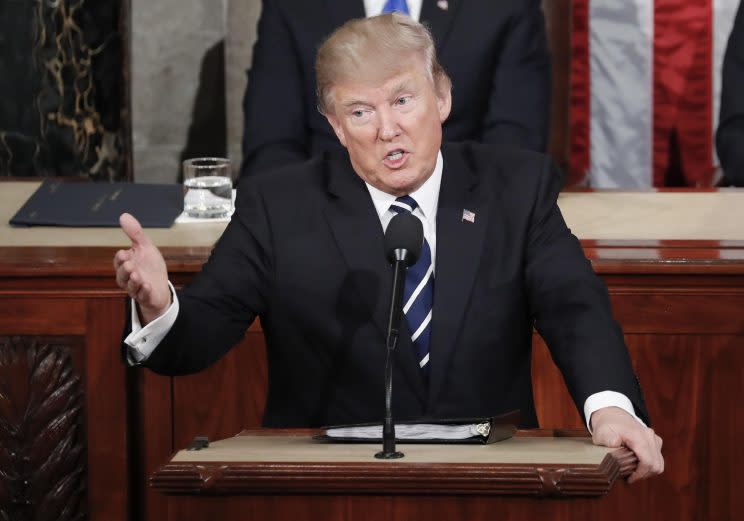Donald Trump derides FDA’s ‘slow and burdensome’ regulatory process for new drugs
President Trump vowed to slash the “burdensome” regulatory process at the Food and Drug Administration (FDA) in his first address to a joint session of Congress on Tuesday, which was by coincidence “Rare Disease Day.”
Trump said the FDA’s approval process is so slow that its keeps “too many advances” — including lifesaving medicines and drugs — from “reaching those in need.”
To illustrate his point, the former businessman told the story of Megan Crowley, who was diagnosed with the rare Pompe disease at just 15 months old and was not expected to live past 5. Her father, John Crowley, founded the company that helped develop the drug that saved her life. Crowley, now a 20-year-old sophomore at the University of Notre Dame, was in the gallery for the speech.
“If we slash the restraints, not just at the FDA but across our government, then we will be blessed with far more miracles like Megan. In fact, our children will grow up in a nation of miracles,” Trump said.
The United Pompe Foundation says Pompe disease is an inherited neuromuscular disorder, estimated to affect between 5,000 and 10,000 people worldwide. Scientists working on rare diseases often have fewer resources and more reluctant investors, which can impede important research.
The commander in chief’s broadside against the FDA predictably split many listeners along ideological lines: some feel that clueless bureaucrats are trapping lifesaving drugs in regulatory purgatory, whereas others think public servants are stopping greedy corporations from pushing shoddy drugs onto the American public.
Beautiful story about perseverance about Megan Crowley & her father. FDA process is slow. Trump is right about that. #JointAddress
— Maria Shriver (@mariashriver) March 1, 2017
Trump started this speech saying he's gonna fight drug addiction, now says he's gonna loosen FDA regs on big pharma. Hmmm… #JointSession
— Keegan Stephan (@KeeganNYC) March 1, 2017
#Trump does not understand the #FDA; Megan Crowly's "life saving" drug secured expedited approval; the system works!
— Reuben A. Guttman (@reubenguttman) March 1, 2017
No, Trump. Crippling the FDA won't lead to "miracles." Well, aside from your supporters dying from contaminated bacon chocolate.
— Aiden Wolfe (@AidenWolfe) March 1, 2017
Frank S. David, the founder and managing director of Pharmagellan, a consultancy for biotech companies, co-authored a peer-reviewed study in the medical journal BMJ Open comparing the FDA’s regulatory process for new drugs with its counterparts in Canada and Europe.
David told Yahoo News that there are two aspects to approving new drugs: the administrative process, which includes paperwork (which typically takes about 10 months), and all the research required before submission: early testing on safety and efficacy and long studies to nail down the drug’s effects (which can take around 8 years).
According to David, most people who characterize the FDA as a burden are referring to the regulatory standard that applies to trials.
“Most people in biotech and pharma for a long time don’t think the FDA is particularly burdensome. They think it’s doing the best it can to appropriately balance safety and effectiveness, and get things out there pretty quickly,” he said in a phone interview.
Over the past decades, he continued, the FDA has offered incentives for companies to develop drugs for rare diseases.

“There’s an argument to be made that we’re already doing a lot in that regard, and even people in the rare disease [community] don’t necessarily think the current situation is overly burdensome,” he said.
According to the FDA, of the 22 new drugs approved in 2016, 15 (68 percent) were designed for “priority review” — meaning a six-month process rather than the standard 10 months. Eight (36 percent) were designated for a “fast track” because they could potentially address unmet demands. Preliminary clinical evidence suggests that seven (32 percent) were “breakthrough therapies,” which means they substantially improved upon what had previously been available.
The Regulatory Affairs Professionals Society, a global nonprofit for the healthcare regulatory workforce, points out that 19 of the new drugs (86 percent) were approved in the United States before any other country.
In 2015, the FDA approved even more new drugs: 45, to be exact. John K. Jenkins, the director of the Office of New Drugs at the FDA’s Center for Drug Evaluation and Research, attributed this disparity in part to fewer new drugs being filed for approval and several drugs being approved ahead of schedule.
Trump also vowed to launch legal reforms that would protect patients and doctors from unnecessary costs and (though he didn’t offer specifics) immediately bring down the artificially high price of drugs — garnering a rare standing ovation from both Democrats and Republicans.
Trump’s attack on the FDA continued one of the major themes of his campaign, the need to pare back government regulations. He has not yet nominated a commissioner to lead the agency.
Read more from Yahoo News:



